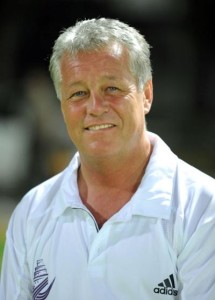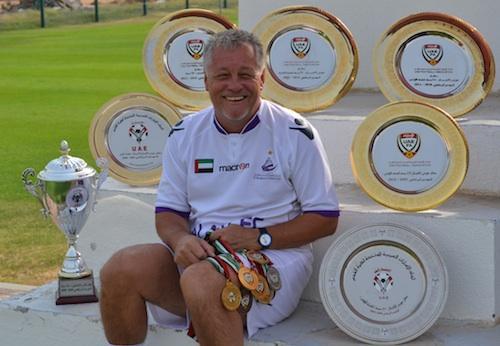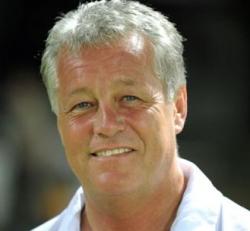Being Positive Instead Of Focusing On The Negative
Wayne Harrison, Co-Founder Soccer Awareness Elite Academy, shares his thoughts on the Power of Positive Reinforcement. A former pro soccer player at Blackpool F.C. in the English Championship league as well as the Academy Director, Harrison was also the Youth Director Al Ain Football Club in the UAE. An author of more than 12 books on soccer coaching, he now coaches youth soccer, writes and presents at coaching symposiums worldwide. Harrison holds a UEFA ‘A’ License and the NSCAA Premier Diploma, as well as a bachelor’s degree in applied physiology and sports psychology. He is the Director of Coaching for Total Futbol Academy.
The Soccer Awareness Elite Academy (SAES) is new a soccer development program, helping develop soccer awareness and intelligence in the USA. It is a non-competitive program that works along side of today’s best youth soccer clubs, providing additional training.
I focus on DEVELOPING THE THINKING PLAYER
“The ultimate goal in coaching is helping each player develop his or her talents and abilities to the fullest. With this in mind, I created the Soccer Awareness philosophy of developmental coaching and training. It simply means training the mind before the body.” Wayne Harrison – Soccer Awareness

I was recently reading a business book called Whale Done by Ken Blanchard. This book is about the power of positive relationships. In this book, the main character, Wes, after watching the Killer Whale show at Sea World, starts to think about the interaction between the two and about what might motivate the whales to put on such a mesmerizing show. He learns while it is natural to see man, the most intelligent animal, training other animals like dogs, parrots, etc, it is actually a role reversal in the Killer Whale cases.
“When you are dealing with an 11,000 lbs animal who does not speak English, you do a lot of learning.” says the trainer. The patience required for convincing the whales to consistently co-operate, trust and befriend their trainer involves a formula, which the authors terms as “accentuating the positive”.
In different situations of our life, while dealing with people we love, we are always eager to discard mistakes, errors and shortcomings. Maybe that’s why people say “Love is blind”.
What Wes sees at SeaWorld is that the trainer pays more attention to catching the whales doing right and then rewarding the whales. But whenever they see some negative behavior, they either ignore it or redirect the energy of the whales to something entirely different. Hence the whales find their trainers always loving and adoring, and this is the foundation of their trust in them.
In Youth Soccer, I have seen and heard coaches yelling and screaming at kids. Putting them down. Yelling from the sidelines, “Play Soccer Boys” or “Pass” or “Dribble” or “Shoot”, etc. The worst part of this all is that the coaches are micromanaging the kids from the sidelines and not teaching the players to think on their own.
Playing Play Stations still coaching is not the answer for elite player development.
Many times I have seen coaches pulling players out of the game and chastising them for making mistakes. It is OK to pull a player out of the game if they are not performing well and ASK him what he or she could do better next time, giving the player/coach experience a good spin as opposed to a NEGATIVE confrontation.
At the Soccer Awareness Elite Academy training sessions, we want players to know that making “mistakes” is OK! This is how we learn, especially as young adults. We must embrace youth players when they make mistakes.
Generally speaking, the beautiful game of soccer immediately tells a player when they have made a mistake.
By yelling and chastising players, the inner person inside the player stats to form a shield to protect themselves from the pain of making mistakes, hence, they will not remember the experience and no learning happens.
The old days of yelling and screaming to get the most out of a player are over. We, as trained professional coaches, now know better. And as coaches, we must adapt. Coaches are mentors and often players seek approval from us. Just because we learned “old school” by being yelled at, it does not mean that was the right way of doing things.
What is the difference between Positive instead of Negative coaching styles? Here are some red flags to look for:
- Coach yelling and screaming commands at the players from the sideline
- Coach having to get the best out of the players using scare tactics
- Players are pulled out of the game and are sat on the bench when they make mistakes
- Players freezing when they make a mistake
- Coach uses derogatory or negative words
- Coach puts down or makes fun of the players who make mistake
- Players are over coached and micro-managed
What to Look for:
- Coaches who provide constructive guidance to players while on the filed and in general have patience with the youth players
- Coaches who make the training sessions fun Coaches who GUIDE players in finding out the right thing to do
- Coaches who use mistakes as Learning Opportunity
- Coaches who care more about DEVELOPING the players vs. winning at all cost
- Half time talks or discussions with players are player driven. Players are asked open ended questions to help them think and develop vs. TELLING them what they have done wrong and TELLING them what to do.
While coaches, like all people, are not always perfect, it is not perfection you are looking for. These recommendations are guidelines and the coach / player relationship is complex. In this first edition of Coaching Insights, I wanted to focus on this important topic of Being Positive Instead Of Focusing On The Negative.
I believe this is the foundation of all coaching and parenting. One of the first words kids learn is “NO”. Why? Because we teach them what not to do. Imagine how much better and how much further our kids would be if they had learned simply WHAT TO DO!
The Soccer Awareness Elite Academy (SAES) is new a soccer development program, helping develop soccer awareness and intelligence in the USA. It is a non-competitive program that works along side of today’s best youth soccer clubs, providing additional training.
This elite academy is focused on developing how a soccer elite player thinks – the MIND of the player – and is based on proven scientific principles of development.






